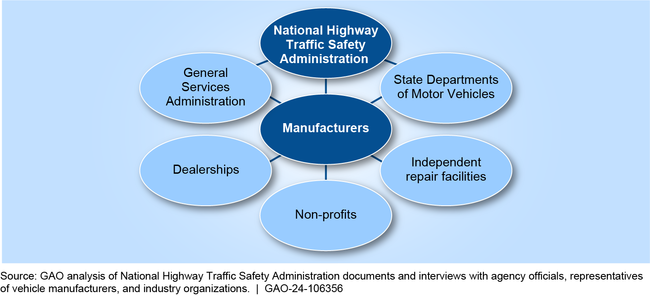Vehicle Safety: Opportunities to Improve Repair Rates for Recalled Vehicles
Fast Facts
The National Highway Traffic Safety Administration oversees vehicle recalls when a defect creates an unreasonable safety risk. Manufacturers must notify vehicle owners of recalls and usually fix the problem for free.
NHTSA monitors repair rates and enforces rules that manufacturers must follow for the hundreds of safety recalls issued each year. Like NHTSA, we found that certain factors influence vehicle recall repair rates, such as owner awareness of a recall.
NHTSA is working to improve how it oversees recalls but needs to look closer at factors influencing repair rates and lessons learned from past recalls. Our recommendations address this.

Highlights
What GAO Found
GAO found five primary factors that influence vehicle recall repair rates (see fig.).
Primary Factors That Influence Vehicle Owners to Respond to Safety Defect Recalls, according to Literature Review and Interviewees

The National Highway Traffic Safety Administration (NHTSA) has conducted research that identified factors similar to those found by GAO. However, NHTSA has not updated this research and does not have plans to do so. Regularly updating this research could allow NHTSA to maintain more up-to-date information on the factors and enable the agency to respond accordingly. For example, technological developments, such as over-the-air technologies, can change these factors. NHTSA officials told GAO that they are seeing a growing number of recalls that can be repaired with over-the-air software updates.
NHTSA and manufacturers collaborate with third parties to improve recall repair rates (see fig.). However, NHTSA has not fully implemented a lessons-learned process to analyze and document lessons learned across all collaborations. As a result, NHTSA may be losing valuable insights that could improve repair rates and help the agency work toward its vision of achieving a 100 percent repair rate for every recall.
Examples of Collaborations the National Highway Traffic Safety Administration and Vehicle Manufacturers Have Engaged in to Improve Vehicle Recall Completion Rates

Why GAO Did This Study
NHTSA is responsible for overseeing recalls when a defect in a vehicle creates an unreasonable safety risk. In 2021, NHTSA reported that 69 percent of passenger vehicles recalled in 2018 had been repaired. High-profile recalls over the last decade highlighted the importance of repairing recalls.
The Infrastructure Investment and Jobs Act includes a provision for GAO to study vehicle recall repair rates. This report examines (1) the primary factors that influence vehicle recall repairs, and the extent to which NHTSA has conducted research to identify these factors; and (2) how NHTSA has identified lessons learned from efforts to collaborate with third parties to improve recall repair rates, among other objectives.
To identify factors, GAO reviewed literature, such as academic studies. To determine how NHTSA has identified lessons learned from collaborative efforts, GAO reviewed documents, such as after-action reports about the Takata air bag recall. GAO interviewed NHTSA officials. GAO also interviewed 27 industry entities—selected based on the literature review, recommendations of other interviewees, and other factors.
Recommendations
GAO is making two recommendations to NHTSA that it (1) develop a plan for regularly conducting research to identify the factors influencing vehicle recall repairs and (2) more fully implement a lessons-learned process to identify lessons from its own and manufacturers' collaborative efforts with third parties. NHTSA concurred with the recommendations.
Recommendations for Executive Action
| Agency Affected | Recommendation | Status |
|---|---|---|
| National Highway Traffic Safety Administration | The Administrator of NHTSA should develop a plan for regularly conducting research to identify the factors that influence vehicle remedies in response to recalls. (Recommendation 1) |
NHTSA concurred with this recommendation. When we confirm what actions NHTSA has taken in response to this recommendation, we will provide updated information.
|
| National Highway Traffic Safety Administration | The Administrator of NHTSA should more fully implement a lessons-learned process to identify lessons from its own and manufacturers' collaborative efforts with third parties that could help to improve recall completion rates. (Recommendation 2) |
NHTSA concurred with this recommendation. When we confirm what actions NHTSA has taken in response to this recommendation, we will provide updated information.
|
